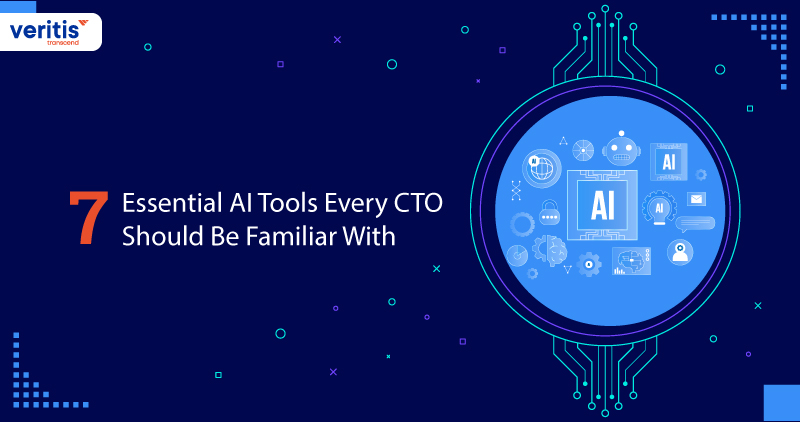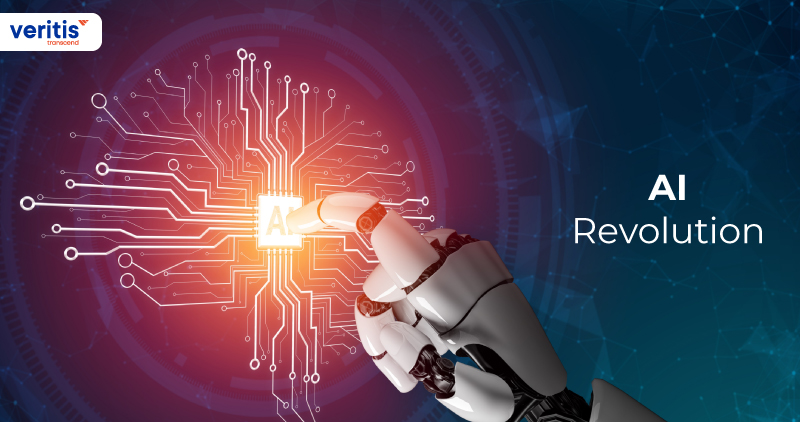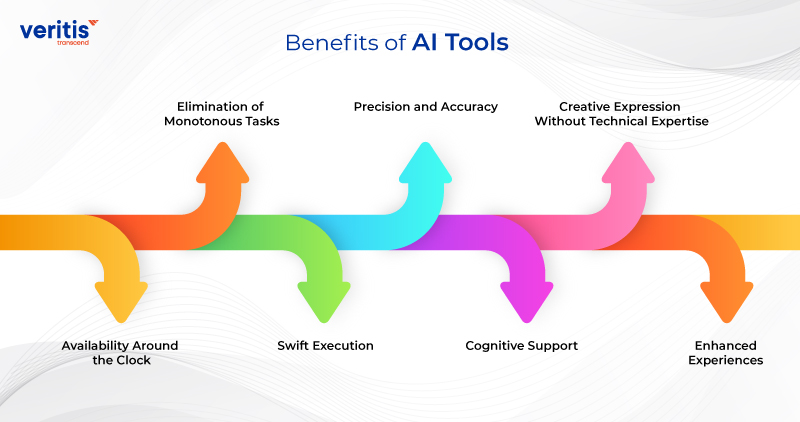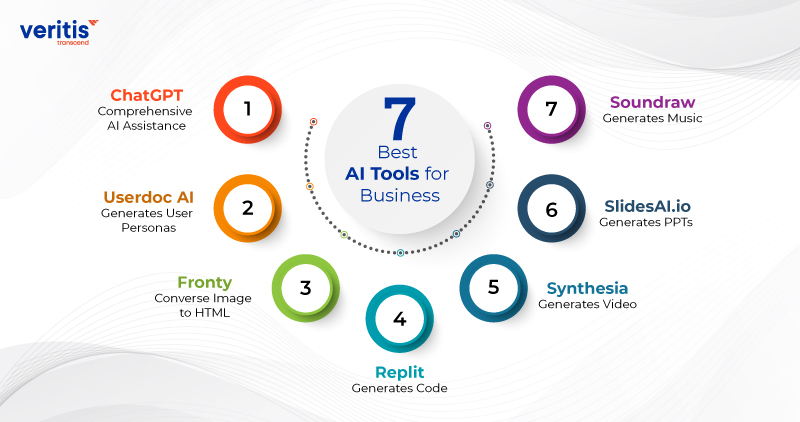
The advent of artificial intelligence (AI) marks a transformative influence in various domains of the technology industry, reshaping how businesses operate and innovate. Chief Technology Officers (CTOs) play a crucial role in navigating their organizations through this technological wave, and staying abreast of the latest AI tools is crucial for success. As businesses across various industries increasingly adopt AI to enhance efficiency, decision-making, and customer experiences, CTOs must strategically leverage cutting-edge tools to stay competitive.
Artificial intelligence (AI) is rapidly evolving, reshaping industries worldwide.
According to Tractica, the global AI market is projected to soar to USD 554.2 billion by 2026, with a remarkable compound annual growth rate (CAGR) of 38% from 2023 to 2026. Regionally, the North American AI market is expected to reach USD 226.3 billion, growing at a CAGR of 36.1%. In comparison, the European AI market is forecasted to hit USD 182.6 billion with a CAGR of 39.2%.
In the Asia Pacific region, the AI market is anticipated to reach USD 145.3 billion, expanding at a CAGR of 37.8%. These figures indicate the widespread adoption of AI technologies globally, underscoring its transformative impact.
PwC’s insights further emphasize the increasing integration of AI in organizations. 84% of organizations leverage AI in some capacity, marking a notable increase from 73% in 2021. A significant 62% of organizations are augmenting their investment in AI in 2023, up from 53% in 2021. Noteworthy applications include using AI to enhance customer experience (57%), automate tasks (55%), and make data-driven decisions (49%). The World Economic Forum projects that AI will generate 97 million new jobs by 2025 and contribute to a 14% boost in global GDP by 2030.
As McKinsey Global Institute forecasts the automation of 45% of tasks currently performed by humans by 2025, the transformative power of AI tools, including ML, natural language processing, robotics, computer vision, and chatbots, becomes increasingly evident. The evolving AI field in 2023 also reflects key trends like Explainable AI (XAI), Generative AI, AI ethics, and its applications in cybersecurity and healthcare, shaping the trajectory of technological innovation in the coming years (Sources: Tractica, PwC, World Economic Forum, McKinsey Global Institute).
The constantly changing array of AI automation tools can be overwhelming, making CTOs need to identify and integrate the best-in-class solutions for their specific needs. This blog will explore seven AI tools that stand out for their innovation, performance, and versatility. These tools span a range of applications, from natural language processing and computer vision to ML frameworks, offering CTOs a comprehensive overview of the diverse AI field. By understanding the capabilities and advantages of these tools, CTOs can make informed decisions to propel their organizations to the forefront of AI-driven innovation.
From streamlining operations to revealing new business insights, AI business tools can revolutionize every facet of an organization. We will delve into these seven best-in-class AI development tools, providing CTOs valuable insights into their features, use cases, and transformative impact on their technological infrastructure. By adopting these cutting-edge AI solutions, CTOs can position their organizations at the forefront of the digital revolution, driving sustainable growth and remaining agile in changing technological fields.
AI Revolution

While it may sound like a cliché, the impact of the best AI productivity tools on software engineering is undeniable. Many machine learning algorithms and tools rooted in AI automation tools are surfacing, offering developers opportunities to enhance their workflow and increase efficiency. The transformative influence of AI is reshaping the landscape of software engineering.
AI demonstrates practical utility across various tasks, from refining test cases to optimizing code efficiency. Developers can leverage AI-infused tools to automate numerous aspects of software engineering, thereby liberating valuable time for concentrating on fundamental development responsibilities. An intriguing realm within this domain is AI-driven software testing. Developers can conduct more comprehensive code testing by employing neural networks to proactively detect potential bugs and errors to prevent them from escalating into significant issues.
It serves as an express route to enhance the developer experience. AI engineering empowers your team to indulge more in aspects of the development process that they genuinely enjoy.
The horizon of software development appears exceptionally promising, courtesy of the formidable capabilities of AI and deep learning. These technologies allow developers to streamline their processes, enhance code quality, and maintain a competitive edge with reduced reliance on human intervention.
Useful link: AI and Cybersecurity: Defending Against Evolving Threats
What Are AI Tools?
AI tools refer to software applications employing artificial intelligence to address particular challenges. These challenges span diverse tasks, including text generation, extensive dataset analysis, and predicting significant events such as earthquakes.
AI automation tools have revolutionized our interactions with technology, which is evident in applications like Siri, Google Maps, and intelligent Netflix algorithms. This AI transformation is poised to gain even more significant momentum in the future.
The rise of a novel form of artificial intelligence, commonly referred to as generative artificial intelligence, is particularly noteworthy. This variant can create original content that has never previously existed. As a result, we anticipate witnessing many valuable applications across various sectors and industries.
The mechanics behind the functionality of these AI business tools raise the question: how do they work? They utilize machine learning algorithms to scrutinize data, derive decisions from identified patterns, and respond to current trends. The result is outcomes that either match or surpass human performance.
Benefits of AI Tools

Using popular AI tools for business, whether for personal or business applications, offers many advantages. Yet, at their core, these tools share a fundamental promise: to simplify our lives. This simplification can manifest in various ways, such as saving time, alleviating disliked tasks, minimizing errors, or boosting creative capabilities.
AI-powered tools take on diverse forms, from browser-based applications and extensions to desktop or mobile apps. Regardless of their format, the likelihood is high that you’ve opted for them due to your acknowledgment of one or more of the following benefits they bring to your life:
1) Availability Around the Clock
AI development tools operate tirelessly, 24/7, without needing rest, compensation, or sick leave. This constant availability ensures a consistent and reliable support system that isn’t bound by human constraints.
2) Elimination of Monotonous Tasks
Optimize your productivity by automating monotonous tasks with AI, streamlining your workflow effortlessly. Experience the efficiency of cutting-edge technology, freeing up valuable time for more strategic endeavors. Explore the future of work with AI-driven solutions, making daily operations smoother and more dynamic.
3) Swift Execution
The speed of AI is unparalleled. Tasks that might take weeks for a human to complete can be executed in minutes, significantly accelerating project timelines and overall efficiency.
4) Precision and Accuracy
Unlike humans, who are prone to errors, AI maintains high accuracy in its operations. This reliability is especially crucial in tasks where precision is paramount, reducing the risk of mistakes and improving overall outcomes.
5) Cognitive Support
AI isn’t just a tool; it’s a thinking partner. When you need assistance brainstorming ideas or problem-solving, AI provides valuable insights, expanding your creative thinking and decision-making capacity.
6) Creative Expression Without Technical Expertise
You no longer require advanced technical skills to express yourself creatively. Best AI tools for business empower individuals to create music, videos, designs, or text without the traditional barriers, democratizing creative endeavors.
7) Enhanced Experiences
AI automation tools contribute to improved digital experiences. From better websites to enhanced applications and more immersive video games, these tools play a pivotal role in elevating the quality of the digital field and enriching user interactions and engagements.
Useful link: Overcoming Challenges: Implementing Generative AI in Healthcare
7 Best AI Tools for Business

Exploring the potential of artificial intelligence (AI) is imperative for businesses striving for efficiency and innovation. We delve into a comprehensive list of AI tools, unveiling how these cutting-edge technologies reshape industries and enhance various aspects of business operations.
1) Comprehensive AI Assistance – ChatGPT
Chat GPT is a flexible AI assistant adept at addressing diverse tasks through interactive dialogues. Its capabilities span various functionalities, including text generation, sourcing tools for UX design, crafting information architecture, generating user flows, and providing valuable advice on UX design. This versatile AI assistant offers a holistic solution for many tasks, enhancing user experiences through interactive and intelligent support.
2) Generates User Personas – Userdoc AI
Userdoc AI provides the capability to create intricate user personas that accurately mirror the characteristics and requirements of your intended audience. This tool empowers you to delve deep into the specifics of your target users, ensuring a comprehensive understanding of their preferences and needs. By leveraging Userdoc AI, you can enhance your user-centric approach, tailoring products and services to better align with your audience’s unique profiles and expectations.
3) Converse Image to HTML – Fronty
Fronty employs artificial intelligence to convert images into HTML and CSS code. This innovative tool enables the AI transformation of static wireframes and layouts into dynamic, interactive websites with minimal effort and time. Users can also optimize the final product in their preferred editor without relying on Fronty-generated code.
4) Generates Code – Replit
An influential platform that generates code snippets and aids developers in various coding tasks. While a UX designer may not necessarily engage in writing code, understanding how the code functions is crucial. This knowledge enables effective communication with developers, facilitating the ability to request edits and engage in discussions using the same coding language.
5) Generates Video – Synthesia
This state-of-the-art artificial intelligence technology brings virtual actors to life. It enables the customization of scripts, offering renowned companies such as Google, Nike, and Reuters a powerful tool to craft compelling and personalized video content that resonates with their audiences.
6) Generates PPTs – SlidesAI.io
A sophisticated platform designed to streamline the process of generating polished and professional PowerPoint presentations. This advanced tool leverages automation to expedite the creation of visually appealing slides, allowing users to focus more on content refinement and strategic communication rather than spending excessive time on design and layout. With its user-friendly interface, the platform caters to both efficiency and visual aesthetics, making it an invaluable resource for individuals and companies seeking to enhance their presentation creation workflows.
7) Generates Music – Soundraw
Experience the innovation of an AI tool that crafts unique music tracks tailored to user preferences and inputs. Users can choose the desired tune’s genre, mood, and duration, leaving the rest to the AI, which seamlessly generates original compositions. This tool simplifies the music creation and ensures a personalized and enjoyable musical experience based on individualized selections.
Conclusion
Ongoing evolution in AI contributes to a growing array of tools reshaping various industries and work processes. The feature best AI tools for business showcase distinct capabilities, automating routine tasks, offering automated data analytics, enhancing customer engagement, and optimizing content for SEO. These tools are not just futuristic concepts but tangible solutions actively fostering efficiency and innovation in today’s contemporary workplaces.
Unlocking their full potential necessitates a keen understanding of specific needs and strategic implementation of these tools. As we navigate the digital age, future AI tools for business are undeniably becoming integral in shaping our professional and personal spheres. Staying curious, well-informed, and discerning in adopting AI innovations is essential.
Backed by notable accolades such as the Stevie Awards and the Globee Business Awards, Veritis stands prepared to deliver customized solutions with a proven track record of excellence. Their expertise aligns seamlessly with the transformative power of AI, ensuring organizations can navigate this revolution strategically and effectively.
Looking for Support? Schedule A Call
Also Read:
- How Does AI Work and How Can it Help Leaders Make Better Decisions
- What is Generative AI: An Ultimate Guide to Amazon Generative AI Tools
- AIOps Vs MLOps: Understanding Significant Differences
- A Guide to APIOps, the Collaborative Approach for API Production
- AIOps Use Cases: How Artificial Intelligence is Reshaping IT Management
- All You Need to Know about Artificial Intelligence as a Service (AIaaS)